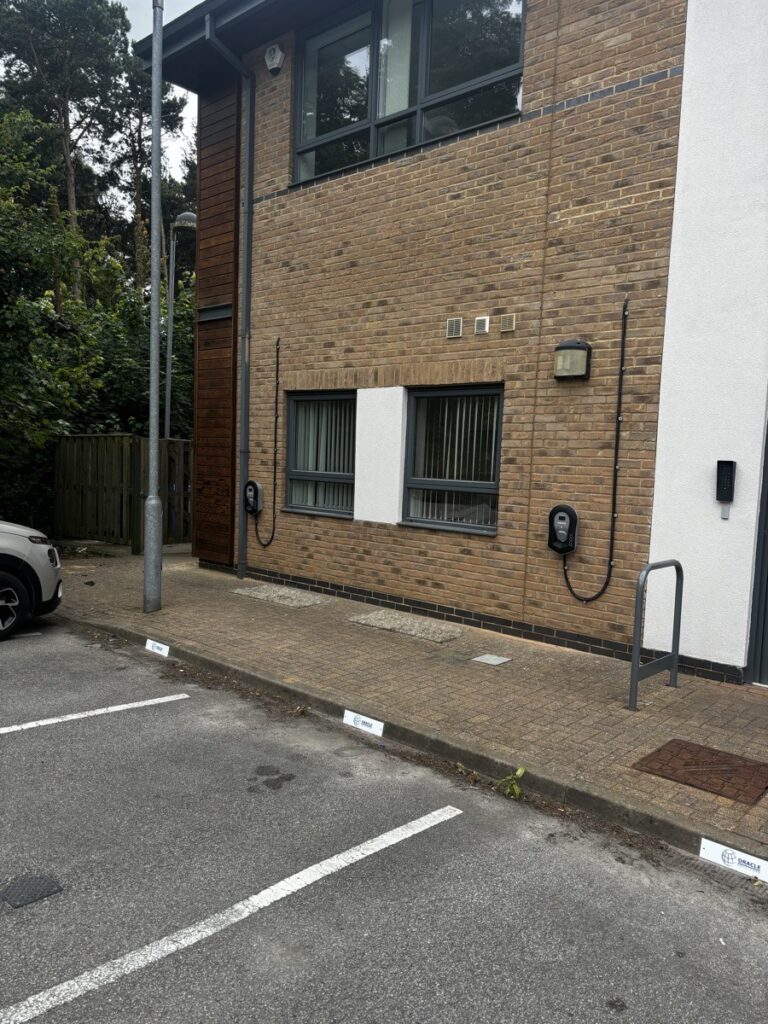
Take advantage of government EV grants grant extension
Electric vehicles aren’t just the future – they’re already here, and businesses are racing to keep up. With a ban on the sale of new petrol and diesel cars coming in 2030, now is the time to prepare for a transition from traditional fuels. The Workplace Charging Scheme (WCS) offers businesses up to £14,000 in funding to install EV chargers on their premises – but this grant ends on the 31 March 2026.
At Glenfield Electrical, we’ve helped 60+ businesses across the Midlands future-proof their workplaces by installing high-quality EV chargers. Here’s how you can take advantage of this opportunity.
Why install EV chargers at your workplace?
Leicester is leading the charge toward sustainability, with over 140,000 electric vehicles expected on local roads by 2030. Installing workplace chargers now can help your business:
- Save up to £14,000 through WCS funding.
- Reduce fuel costs and maintenance expenses by transitioning your fleet to electric.
- Enhance your company’s green credentials and appeal to environmentally conscious clients.
If you’re considering the WCS, make sure to act before March 2026 to take full advantage.
What is the workplace charging scheme?
The WCS is a government grant designed to encourage businesses to invest in EV infrastructure. It offers a discount of up to £350 per charging socket, for a maximum of 40 sockets. This means you could save up to £14,000 on installation costs.
By taking advantage of the grant, you can:
- Reduce the upfront installation costs significantly.
- Promote cleaner transport and enhance your sustainability efforts.
- Future-proof your workplace as the UK moves towards widespread EV adoption.
Who can apply for the WCS?
The WCS is open to a wide range of businesses and organisations looking to install EV charge points on their premises. However, you must meet certain eligibility requirements to make use of the funding.
To apply for the WCS, your business must meet the following requirements:
- Be a registered business, charity or public sector organisation in the UK.
- Have off-street parking that is dedicated for staff, fleet, or business use.
- Demonstrate a need for EV charging facilities, either for employees or company-owned vehicles (You do not need to currently have EVs in your fleet but should have plans to use them in the future.)
- Own the property or have permission from the landlord to install EV chargers.
- Use an OZEV-approved installer to carry out the installation.
Whether you operate a small office, corporate headquarters or a logistics hub with a fleet of vehicles – this scheme is for you!
How does it work?
Applying for WCS is a simple, three-step process:
- Apply online: Submit an application through the government’s online portal. If eligible, you will receive a voucher code via email.
- Redeem your voucher: Once you have your voucher, you can contact an OZEV-approved installer like Glenfield Electrical to carry out the installation.
- Claim the grant: Your installer will redeem the voucher on your behalf after installation, reducing your overall costs by up to £350 per socket.
Glenfield Electrical handles all the paperwork for you, ensuring a smooth and hassle-free process.
Note: Vouchers are valid from 180 days of being issued and installation must be completed within that time.
Why now is the time to transition to electric fleets
Fuel savings
One of the biggest cost differences is in refueling:
- A petrol car driving 10,000 miles costs £1,209 in fuel, while an EV costs just £174 in electricity.
Maintenance savings
Electric vehicles typically have lower maintenance costs due to fewer moving parts and simpler mechanical systems:
- EVs don’t require oil changes and use regenerative braking, extending the life of brake pads.
- On average, EV maintenance bills (including MOT tests, servicing and repairs) cost from 29% less for EVs compared to other fuel types.
Tax benefits
Your business could claim significant tax incentives:
- The 100% First Year Allowance (FYA) lets companies deduct the full cost of zero-emission vehicles from taxable profits.
- Benefit-in-Kind (BiK) tax savings: In 2025-2026, BiK rates will be 3% for electric vehicles and 26% for petrol and diesel vehicles, meaning businesses and employees using EVs will benefit from significantly lower company tax.
Sustainability benefits
Electric vehicles offer significant environmental advantages:
- Zero tailpipe emissions: EVs produce no harmful pollutants in comparison to petrol and diesel vehicles, improving air quality in urban areas.
- Noise reduction: EVs are quieter than petrol or diesel cars, creating more peaceful urban environments.
Act now: secure your workplace charging grant before March 2026
Don’t miss out on the Workplace Charging Scheme grant, which ends at the end of March 2026. Contact Glenfield Electrical today either by telephone on 0116 2873 226 or email info@glenfieldelectrical.com for a free consultation and quote and take the first step toward future-proofing your workplace with high-quality EV chargers.
